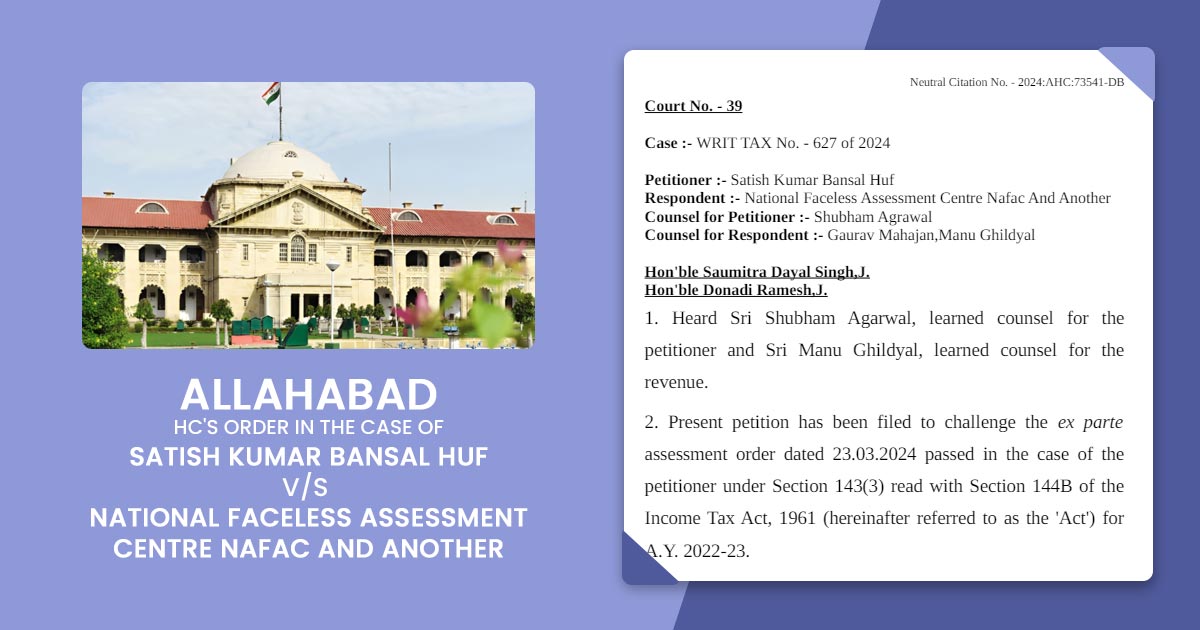
The Allahabad High Court has ruled that the chance of a personal hearing is obligatory u/s 144B(6)(vii) and (viii) of the Income Tax Act, 1961 when SCN is issued for why assessment may not be completed as proposed. The Court ruled that once the taxpayer asks for a chance of a personal hearing, it becomes mandatory for the Assessing Authority to grant that opportunity Under Section 144B(6)(viii).
Section 144B furnishes for Faceless Assessment. Section 144B(6)(vii) furnishes that if the assessment proceeds, the taxpayer or his authorized representative may ask for a personal hearing to make his oral submissions or demonstrate his case before the income-tax authority. Section 144B(6)(viii) delivers that where a “request” of a personal hearing has been obtained via the authority, this opportunity must be granted via the National Faceless Assessment Centre in a stated manner.
In the Judgment, Justice Saumitra Dayal Singh and Justice Donadi Ramesh Ruled That
The word “request” used u/s 144B(6) (vii) and (viii) only implies, where a taxpayer might deliver his written reply to the show-cause notice but not opt to claim the chance of a personal hearing, it may not be obligatory for the Assessing Officer to grant these chance of personal hearing if he plans to accept the explanation provided. He may pass a relevant ex parte order accepting the explanation that the taxpayer provided.
Read Also:- Gujarat HC Rejects IT Assessment Order Citing Violations of Section 144B
The court stated that established on the provided answer if the assessing officer shapes a tentative opinion to pass an unfavourable assessment order, he should fix a date for a personal hearing and communicate it before the taxpayer as per the provisions of the Act. The Assessing Officer can proceed as per the law only if the assessee fails to claim the opportunity so provided,
An Overview of the Case
A notice on 11.03.2024 was obtained before the petitioner to appear on 15.03.2024. As the applicant was unable to appear on the short date fixed, the applicant furnished for an adjournment on 16.03.2024. on the adjournment application, the Assessing Officer fixed the next date as 17.03.2024, i.e. the next day. The petitioner could not appear as the same was a Sunday, and an assessment order u/s 143(3) read with Section 144B of the Income Tax Act was passed dated 23.03.2024.
The applicant contested the assessment order for the breach of the principles of natural justice. But against the maintainability of the writ petition, an objection was raised, and the court ruled that the applicant had adequately represented the cause for the petition to be maintainable.
Verdict of the High Court
The Court said that it was not optional for the Assessing Officer to grant a chance of hearing u/s 144B(6)(vii) and (viii), but it was mandatory under the scheme of the Act.
The court noted that the written answer could often be interpreted in exceeding than 1 way. As the assessment proceedings engage in both the questions of the particulars and statutes, the court ruled that only written explanations might not be adequate in these matters.
It is common that in the course of a judicial or quasi-judicial proceeding the written document may be read in more than one way. It is correct that all explanations and replies. Also, language and writing are a mode of communication.
They differ from person to person. Often identical thoughts are defined differently by distinct persons leaning upon their skill and preferred use of expressions and method of writing. Hence, what may be intended to be communicated through the taxpayer via proposing his written reply, may be obtained distinctly through the Assessing Officer on a simple ex parte reading of the same.
The High Court while noting that the subsequent date fixed by the assessing officer was a Sunday stated that the assessing officer was mandated to set a date before passing the assessment order. The court ruled that a breach of principles of natural justice is there and consequently, the assessment order was set aside.
The court ruled that when the assessing officer was accepting the response filed via the applicant, the assessment order might get passed without the chance of a personal hearing. The court rendered the assessing officer to obligatory provide the chance of a personal hearing when the response was rejected.
As per that, the writ petition was permitted.
| Case Title | Satish Kumar Bansal Huf v/s National Faceless Assessment Centre Nafac and Another |
| Case No.:- | WRIT TAX No. – 627 of 2024 |
| Date | 26.04.2024 |
| Counsel For Appellant | Shubham Agrawal |
| Counsel For Respondent | Manu Ghildyal |
| Allahabad High Court | Read Order |